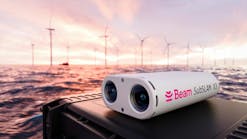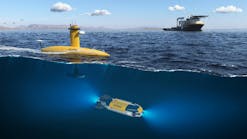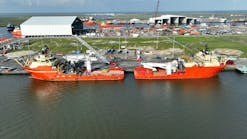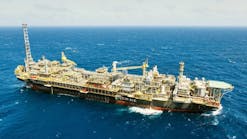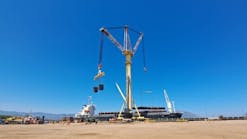Gene Kliewer • Houston
Subsea separation coming to Marlim off Brazil
Petrobras has awarded FMC Technologies a contract to supply a subsea separation system for Marlim field offshore Brazil in the Campos basin. The contract value is approximately $90 million.
The project “firsts” include deepwater deployment of subsea separation at a mature field and also, the first subsea separation of heavy oil and water. Another first will be the subsea reinjection of water for improved recovery purposes.
FMC will supply a subsea separation and pumping system. The separation module will separate heavy oil, gas, sand, and water on the seabed at a depth of 2,950 ft (900 m). The module will apply a novel pipe separator design licensed and developed by FMC in cooperation with StatoilHydro.
The equipment is to be engineered jointly by FMC operations in Brazil, Norway, and the Netherlands. Final manufacturing and integration are to be done at FMC’s Rio de Janeiro facility. Delivery is scheduled to begin in 2011.
NCS Survey contracts SeeByte AutoTracker for AUV
NCS Survey has chosen AutoTracker for its AUV fleet. The AutoTracker technology enables AUVs to detect and track a pipeline. This system will be integrated into both NCS’s recently acquired Gavia Offshore Surveyor AUVs rated at 500 m and 1000 m respectively.
The system has been tested in recent operations with a Gavia AUV in Iceland. The trials were followed by successful operations in Azerbaijan inspecting a number of pipelines in the landfall area. With AutoTracker, the AUV can be made to fly at a predetermined offset from the pipeline and the side-scan data can be kept in the “sweet-spot” for the duration of the survey.
Petrobras issues global umbilical supply order
Oceaneering International Inc. has landed an umbilical supply contract from Petrobras for four exploration and production units offshore Brazil. The order is for as many as 52 electro-hydraulic thermoplastic control umbilicals totaling165 km (100 mi) in length for water depths down to 6,500 ft (1,981 m). Contract value is between $44 million and $64 million.
Manufacture is under way at Oceaneering’s facility in Niteroi, Brazil, and is scheduled for completion in late 2010.
New flex riser inspection system revealed
FlexRiserTest has develop-ed an underwater radiography inspection system for flex- ible risers. FlexRiserTest, a collaboration among European Union companies and research organizations, says this prototype is the first-ever marinized digital radiograph flat panel detector. Unlike oth- er radiographic detectors, no film or plates need to be developed and processed topside. The digital detector does not need to be removed between individual exposures. The digital images are sent to the surface via an umbilical.
To facilitate surveying, FlexRiserTest also developed a robot crawler to deploy the system. Both have been tested to 20 m (65 ft) and plans are under way for sea trials. The developers target inspections of structures such as umbilicals, pipes, and flexible risers.
Record bend stiffener manufactured.
Record size bend stiffener tested
Trelleborg Offshore has designed, manufactured, and tested what it calls the world’s largest bend stiffener for Aker Solutions use on StatoilHydro’s Vega field, North Sea.
This record-breaker was designed for a 240-mm (9.5-in) diameter umbilical and installed by Subsea7. It has an overall length of 11.3 m (37 ft) and a base diameter of 1,315 mm (4.3 ft). The weight in air of the component is 8,340 kg (9.2 tons). It required a total polyurethane volume of 5,360 l 1(416 gal).
Heriot-Watt University successfully defended its Student Autonomous Underwater Competition – Europe title at the Qinetiq Ocean Basin, Gosport, UK. Heriot-Watt designed and built a hover-capable AUV, theNessie IV. The AUV tracked a moving mid-water target, hovered above a ground target, used sonar to follow a wall, and docked underwater. BP and PNI Corp. sponsored the team.
Grenland has delivered the manifold destined for StatoilHydro’s Norne field in the North Sea to FMC Technologies. This new template will add production to the Norne FPSO. A 250-metric ton (276-ton) protection structure for the manifold also is on the delivery contract.




